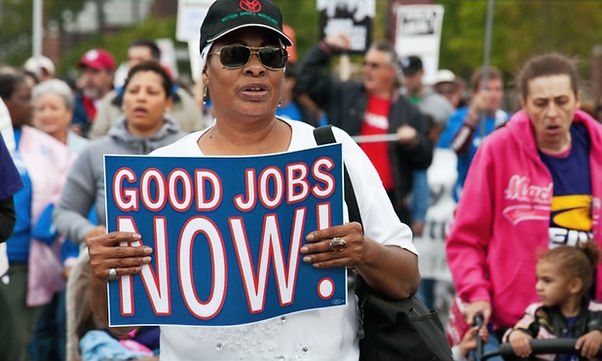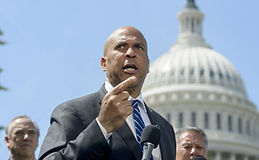Memo to Governor-elect Mikie Sherrill and
New Jersey State Legislators:
How Job Guarantee Can Work in
New Jersey
The elections are over! Now it's up to the newly elected state leaders to pass laws that can provide real economic relief and more job opportunities for working people.
Learn how a Job Guarantee can work in New Jersey!

To: Governor-elect Mikie Sherrill and New Jersey State Legislators
From: Full Employment Now-Political Action Committee (FEN-PAC)
Re: Supporting a State Job Guarantee to create living-wage jobs for the unemployed and underemployed, while uniting working people across racial and political divides
What is a State Job Guarantee?
Bad News: President Trump and the Republican-controlled Congress have cut $1.4 trillion in federal funding from health care, food assistance, and student loan programs. They have also eliminated 30,000 federal jobs— all while 60% of Americans live paycheck to paycheck and struggle with the rising cost of living!
Good News: Democrats still control 15 state legislatures—including New Jersey—known as blue trifecta states, where they have the power to pass state-level Job Guarantee policies. These policies can create living-wage jobs by investing in vital public programs and services, while also bringing together working-class voters across racial and political lines.
The following State Job Guarantee policy proposal is based on the "Federal Jobs Guarantee Development Act of 2023" introduced by New Jersey U.S. Senator Cory Booker and U.S. Representative Bonnie Watson Coleman.
“Every adult should have access to a job with a living wage, good benefits, and safe working conditions. A federal job guarantee program will bring more people into the labor force and help address the labor shortages within key sectors that are currently underserved.”
- U.S. Senator Cory Booker
"The Federal Jobs Guarantee Act creates a pilot program for the communities who need it most, giving good paying jobs to people who have suffered while both wages and opportunities have lagged. The work they’ll do will make tangible improvements in those same communities and reverberate through the national economy,"
- U.S. Representative Bonnie Watson Coleman
Specifically, a New Jersey State Job Guarantee Would:
-
Select up to 15 sites in New Jersey to launch Job Guarantee pilot programs in areas with high unemployment. Site selection should be based on local needs and assets, ensuring that the work supports vital state and community priorities that are often underprovided by the private sector—such as child and elder care, infrastructure, community revitalization, and other essential public services.
-
Guarantee that every adult with residence in a pilot community may participate in a guaranteed job. Jobs will include a minimum wage phasing in to $20/hour, paid family and sick leave, and health coverage comparable to that provided to state employees and elected officials.
-
Introduce competition into the labor market to raise wages and benefits: Low wages are partly caused by labor market concentration, which gives employers the ability to reduce wages for lower- and middle-income workers. A Job Guarantee would set a de facto wage and benefits floor by giving people the option to take guaranteed public employment. Employers offering poverty-level wages and poor benefits would struggle to hire and retain workers, forcing them to improve compensation to stay competitive.
-
Provide job training to help Job Guarantee participants succeed in their roles and to enable unemployed or underemployed individuals to qualify for jobs they otherwise would not be eligible for.
-
Require that each pilot community create a “Community Job Bank” website, which will feature high-impact jobs sourced primarily by local communities, as well as state agencies, based on their needs and priorities;
-
Address labor shortages by growing the pool of trained, employed, and job-ready individuals through the Job Guarantee program, from which private employers can recruit during workforce shortages.
-
Provide state tax credits to incentivize private employers to recruit and hire participants from the Job Guarantee pilot program, with the condition that they offer, at a minimum, a living wage and benefits comparable to those provided by the program.
-
Authorize a rigorous evaluation of the program’s implementation and impact across a number of metrics, including unemployment rates, private sector wages, safety net spending, and incarceration rates.
-
Protect current public sector workers from displacement by Job Guarantee pilot program participants, and prohibit placing Job Guarantee employees in unionized workplaces without the union's consent and collective bargaining over their terms and conditions of employment.


How Would a State Job Guarantee
Work in New Jersey?
Frequently Asked Questions About a State Job Guarantee
How much will a State Job Guarantee pilot program cost in New Jersey?
The cost to implement a full-scale State Job Guarantee to create jobs that pay $20 per hour plus benefits for approximately 116,000 New Jersey residents currently receiving unemployment benefits would cost an estimated $5.36 billion per year. However, the cost of implementing a Job Guarantee pilot program would be significantly less!
The State Job Guarantee pilot program, previously outlined, allows the New Jersey Legislature to determine the size and scale of the pilot program that aligns with the state's budget priorities. For example, if the New Jersey Legislature decides to include 1,000 unemployed residents in the State Job Guarantee pilot program, then the cost would be $46.2 million per year, 0.08% of New Jersey's $58.8 billion 2026 budget.
A State Job Guarantee can potentially pay for itself and save taxpayer dollars by reducing the usage and cost of existing public assistance programs. Research indicates that most social problems—from homelessness and child malnourishment, to mental and physical health problems, to certain types of crime—are connected in one way or another to unemployment. For instance, New Jersey’s total expenditure for public assistance programs in fiscal year 2025 amounted to approximately $9.71 billion in state appropriations through the Department of Human Services; that's $4.4 billion more than it would cost to implement the full-scale State Job Guarantee referenced above.
It is important to note that the intention is not for the state of New Jersey to bear the total cost of a full-scale State Job Guarantee. The goal of the pilot program is to develop a successful model for a Job Guarantee that can persuade the federal government to invest in a permanent Job Guarantee program that would be expanded in New Jersey and other states across the country. However, that depends on our ability to elect 'pro-Job Guarantee' Democrats to Congress and the White House in 2028.
FEN-PAC's State Job Guarantee cost estimates are based on a comparative cost analysis from "The Job Guarantee: Design, Jobs, and Implementation," by Pavlina R. Tcherneva, President, Senior Scholar, Levy Economics Institute of Bard College.
How can New Jersey pay for a State Job Guarantee pilot program?
The New Jersey Legislature recently passed a $58.8 billion budget for fiscal year 2026, which includes a $6.7 billion surplus. This surplus could be used to fund a State Job Guarantee pilot program, based on the previously referenced cost estimates and scenarios.
What types of jobs would be created under a State Job Guarantee?
State and municipal agencies will be required to consult with local residents, community, and labor organizations to assess local needs and make recommendations for new job opportunities. Ultimately, the types of jobs created by a State Job Guarantee depend on the creativity and commitment of public sector workers, public agencies, not-for-profit organizations, and local residents. The only limitations on the type of jobs created under this program are within our ability to imagine new ways of meeting human and societal needs.
Specific categories of jobs that could be created through a State Job Guarantee include:
-
The construction, reconstruction, rehabilitation, and site improvement of affordable housing and public facilities, including improvements in the energy efficiency or environmental quality of such public facilities or housing.
-
The provision of human services, including childcare, health care, support services for individuals and families with special needs, education, after-school and vacation programs for children, and recreational and cultural enrichment programs for persons of all ages.
-
Jobs that provide disadvantaged youth with opportunities for employment, education, leadership development, entrepreneurial skills development, and training.
-
The repair, remodeling, and beautification of schools, community centers, libraries, and other community-based public facilities, and the augmentation of staffing for the services they provide.
-
The restoration and revitalization of abandoned and vacant properties to alleviate blight in distressed and foreclosure-affected areas.
-
The expansion of emergency food programs to reduce hunger and promote family stability.
-
The augmentation of staffing in Head Start and other early childhood education programs to promote school readiness, early literacy, life-long learning, and family involvement in their children’s education.
-
The maintenance, renovation, and improvement of parks, playgrounds, and other public spaces.
-
Providing labor for non-capital-intensive aspects of state or municipal-funded infrastructure projects.
-
The implementation of environmental initiatives designed to conserve natural resources, remediate environmental damage, reverse climate change, and achieve environmental sustainability.
-
The enhancement of emergency preparedness for natural and other community disasters and post-emergency assistance for the victims of disasters.
-
The expansion of work-study opportunities for secondary and post-secondary students, and the creation of “bridge employment” opportunities for recent graduates who have been unable to find work in the occupations for which they have trained.
-
Programs that emulate the Federal art, music, theater, and writers projects of the Works Projects Administration by providing work for unemployed writers, musicians, artists, dancers, and actors on projects that are consistent with the public service and equality-enhancing objectives of this Act.
Does a Job Guarantee cause inflation?
No, a Job Guarantee is actually a way to lower inflation! There are only two main ways to manage inflation through employment. One is to let unemployment rise or fall depending on the state of the economy—which is how things currently work. The other is to create a public program, such as a Job Guarantee, that directly hires unemployed people and adjusts in size as economic conditions change.
Currently, the Federal Reserve (the Fed) uses unemployment to control inflation. The non-accelerating inflation rate of unemployment (NAIRU) is the standard policy guide for deciding when to step on the brakes and slow down economic growth. When the Fed believes that too many people are employed and this could drive prices up, it raises interest rates to reduce consumer spending, increase unemployment, and ease inflationary pressures that may result from too many people having jobs and rising incomes.
In contrast to the standard Fed policy, a Job Guarantee program would expand during bad economic times to create more jobs and shrink during good times as the private sector generates more living-wage employment. It would combat inflation similarly—by adjusting the size of the workforce—but without causing job losses. Instead, it would offer employment to anyone who wants it, provide living-wages, strengthen communities, and reduce the social and economic costs of unemployment.
NOTE: While a Job Guarantee program can help fix problems that drive up prices—such as shortages of workers or materials—it is not a complete solution to inflation. Inflation can come from many different causes, and the Job Guarantee is not meant to address all of them. Other government tools, such as taxes, spending, and interest rate policies, would still be needed.
Click here for a more in-depth FAQ about a Job Guarantee

A State Job Guarantee Can Unite Working-Class Voters Across Racial and Political Divides
Polls have shown that nearly 70% of New Jersey voters support a Job Guarantee, and that voters nationwide strongly support a Job Guarantee across political divides: 89% of Democrats, 74% of Republicans, and 72% of Independents.
During a time when President Trump and Republicans are constantly inflaming racial division and implementing unprecedented cuts to vital public programs and services that have a major negative impact on working-class Americans of all races. A Job Guarantee can be a powerful unifying issue that makes all Americans feel financially secure and part of a system that works for them.
To build real unity among working-class voters across racial and political divides, FEN-PAC is mobilizing volunteers and paid organizers to go door-to-door in working-class neighborhoods. The message is clear: no matter your race, background, or political beliefs, we all want the same thing— access to living-wage jobs to provide financial security for ourselves and our families.
Achieving a Job Guarantee starts with recognizing that we have more in common than what divides us. When we come together, listen to one another, and speak with a united voice, we can demand a political and economic system that truly works for us all.
URGENT CALL TO ACTION!
Want to take action to help pass a Job Guarantee in New Jersey? Here’s what you can do:
1. Sign our "Quick Facts" petition: Show state elected leaders that New Jersey voters and organizations are united around a Job Guarantee
2. Help create 500 living-wage organizer jobs: Chip in $25 or any amount to help fund 500 part-time Relational Organizer positions across New Jersey, each paying $4,000 per month.
3. Sign up as a Volunteer-to-Paid Relational Organizer: Start as a volunteer mobilizing your friends and family around a Job Guarantee, with a pathway to a paid part-time Relational Organizer role earning $4,000 per month.
.png)